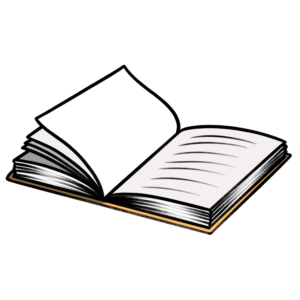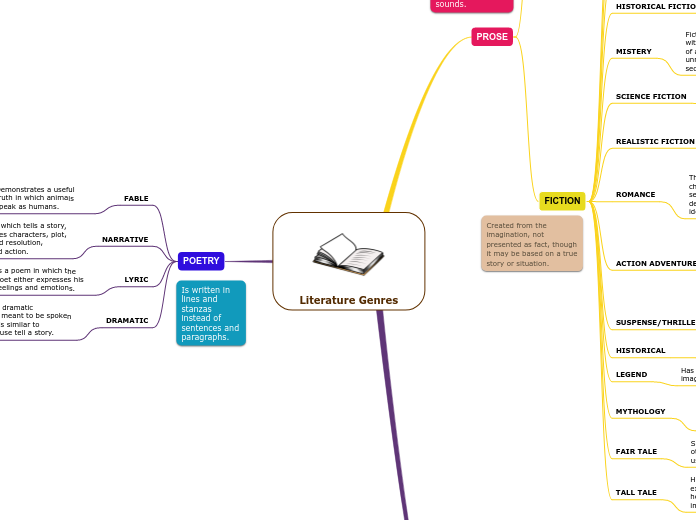
Literature Genres
PROSE
NON-FICTION
BIOGRAPHY
Chooses to focus on one specific person’s experience rather than all important players.
AUTOBIOGRAPHY
Is a self-written life story.
NARRATIVE
Is a report of related events presented to listeners or readers, in words arranged in a logical sequence.
PERIODICAL
Category of serial publications
Appears in a new edition on a regular schedule.
HISTORY
Consists of true accounts of historical eras and events
ESSAY
A short literary composition that reflects the author's outlook or point.
SPEECH
Public address or discourse.
FICTION
FICTION IN VERSE
Novels with plot, theme, major and minor characters, in which the narrative is presented in verse form.
FANTASY
Fiction which invites suspension of reality.
FOLKLORE
The songs, stories, myths, and proverbs of a people or "folk" as handed down by word of mouth.
HISTORICAL FICTION
Story with fictional characters and events in a historical setting.
MISTERY
Fiction dealing with the solution of a crime or the unraveling of secrets.
SCIENCE FICTION
Story based on impact of actual, imagined, or potential science.
Usually set in the future or on other planets.
REALISTIC FICTION
Story that can actually happen and is true to life.
ROMANCE
They are characterized by sensual tension, desire, and idealism.
ACTION ADVENTURE
Puts the protagonist in physical danger, characterized by thrilling near misses, and courageous and daring feats.
SUSPENSE/THRILLER
Involves pursuit and escape. It is filled with one or more ‘dark’ characters
HISTORICAL
Important historical figures are portrayed as fictional characters.
LEGEND
Has a basis in fact but also includes imaginative material.
Sometimes of a national or folk hero story.
MYTHOLOGY
Based in part on historical events, that reveals human behavior and natural phenomena by its symbolism.
Often pertaining to the actions of the gods.
FAIR TALE
Story about fairies or other magical creatures, usually for children.
TALL TALE
Humorous story with blatant exaggerations, swaggering heroes who do the impossible with nonchalance.
DRAMA
TRAGEDY
Treats in a serious and dignified style the sorrowful or terrible events.
COMEDY
Are usually humorous plays.
FARCE
Is a type of comedy.
Depends less on a narrative storyline and more on physical humor.
OPERA
The characters sing each line rather than speaking.
The entire production is set to a musical score.
MELODRAMA
Tells a serious story in serious ways.
MUSICAL DRAMA
Darker themes than in a melodrama, such as human suffering, hatred, or poverty.
Reaches a tragic catharsis.
TRAGICOMEDY
Has a serious storyline told in a humorous, sardonic, or snide way.
POETRY
FABLE
Demonstrates a useful truth in which animals speak as humans.
NARRATIVE
Is a poem which tells a story, and includes characters, plot, conflict and resolution, setting and action.
LYRIC
Is a poem in which the poet either expresses his feelings and emotions.
The poet presents a character in first person to express his emotions.
DRAMATIC
Also known as dramatic monologue, is meant to be spoken or acted, and is similar to narrative because tell a story.
